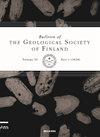High-resolution LiDAR mapping of glacial landforms and ice stream lobes in Finland
IF 1.3
4区 地球科学
Q2 GEOLOGY
引用次数: 31
Abstract
Newly available high resolution airborne LiDAR (Light Detection And Ranging) technology is generating unprecedented next-generation imagery of Earth surface features. LiDAR datasets are being employed by the Geological Survey of Finland (GTK) as part of a new national geological initiative (Glacier Dynamic database: GDdatabase) to rapidly and cost-effectively map glacial landforms and sediments left by the last (Late Weichselian) Fennoscandian Ice Sheet (FIS). There is a high demand for such data in hydrogeological, geoengineering and mineral exploration projects and also for the identification of glacial landforms that provide key information regarding ice sheet rheology, growth and decay. An important step forward with this new technique is the recognition of paleoice stream corridors with fast flowing ice (> 3 km yr-1 based on modern ice sheets), surrounded by stagnant or sluggish-flowing ice. Precise geomorphic criteria are now available for recognition of paleo-ice streams, based on the elongation of subglacial streamlined bedforms and the presence of megascale glacial lineations. Flow sets of drumlins and megascale glacial lineations can now be mapped in high resolution using LiDAR and are now seen as genetically related forms in a continuum that records increasing ice flow velocity and the creation of a low friction bed. This paper briefly outlines the nature of the GDdatabase and the methodology behind its construction and provides examples of principal bedform types that record the dynamic interplay of paleo-ice stream lobes in the Finnish sector of the last FIS.芬兰冰川地貌和冰流叶的高分辨率激光雷达测绘
最新可用的高分辨率机载激光雷达(光探测和测距)技术正在生成前所未有的下一代地球表面特征图像。芬兰地质调查局(GTK)正在使用激光雷达数据集作为一项新的国家地质倡议(冰川动态数据库:GDdatabase)的一部分,以快速和经济有效地绘制最后(晚期魏希selian)芬诺斯坎德冰盖(FIS)留下的冰川地貌和沉积物。水文地质、地球工程和矿产勘探项目对这类数据的需求很大,而且对确定冰川地貌的需求也很大,因为冰川地貌可以提供关于冰盖流变、生长和衰变的关键信息。这项新技术向前迈出的重要一步是识别出具有快速流动冰的古冰流走廊(以现代冰盖为基础,每年约30公里),周围是停滞或缓慢流动的冰。基于冰下流线型河床的延伸和超大尺度冰川线的存在,现在有了精确的地貌标准来识别古冰流。如今,利用激光雷达(LiDAR)可以绘制出高分辨率的冰鼓流集和巨型冰川线,并将其视为连续体中遗传相关的形式,记录了冰流速度的增加和低摩擦床的形成。本文简要概述了gd数据库的性质及其构建方法,并提供了记录最后一次FIS芬兰部分古冰流叶的动态相互作用的主要床型类型的示例。
本文章由计算机程序翻译,如有差异,请以英文原文为准。
求助全文
约1分钟内获得全文
求助全文
来源期刊
CiteScore
1.30
自引率
0.00%
发文量
5
审稿时长
>12 weeks
期刊介绍:
Bulletin of the Geological Society of Finland (BGSF) publishes research articles and short communications in all branches of geosciences. Contributions from outside Finland are welcome, provided that they contain material relevant to Finnish geology or are of general interest.

 求助内容:
求助内容: 应助结果提醒方式:
应助结果提醒方式:


